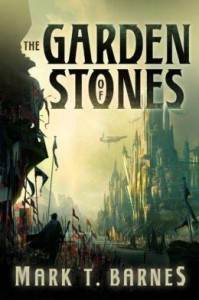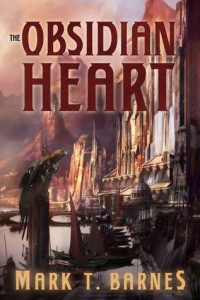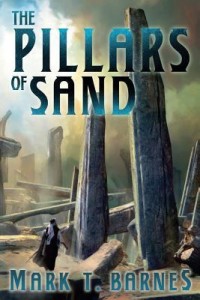When I read The Garden of Stones last spring, it absolutely blew me away. It arrived as a review book from Library Journal, and all I can say is that those can be hit or miss. The Garden of Stones was such a big hit that I gave it a starred review in LJ and included it in my Best of 2013 list. The Obsidian Heart (reviewed last week) is every bit as excellent, and now I’m stalking NetGalley for The Pillars of Sand.
If you love epic fantasy on a grand scale, immerse yourself in this series. You’ll be utterly lost in this world, and never want to come out.
The Past Informing the Present
by Mark T. Barnes
 When I was talking to Marlene about the topic of the blog article, she raised a point about how in The Garden of Stones there was the sensation of being dropped into the middle of a story, rather than getting a gentle introduction.
When I was talking to Marlene about the topic of the blog article, she raised a point about how in The Garden of Stones there was the sensation of being dropped into the middle of a story, rather than getting a gentle introduction.
There’s a line in The Obsidian Heart from Mari’s point of view that says, the ripples of today were stones in the waters of yesterday. We form our truths from the facts of what’s gone before. You can’t separate what was from what is. You can only change what will be. It’s Mari admitting that for good or ill, she is who she because of everything she has seen and done in her life up to that point.
My view of characters is that they should have realistic motivations that are rooted to events a reader can understand. We’re all of us born, our values shaped by history, society, cultural mores, our family, and our friends. Who we are in our own story changes as we progress through life and experience what it has to offer. But none of us started out at the beginning of history, we’re only page one of our own story: there are millennia of civilisation across the globe that precede us, with history that shaped the world in which we live. We in turn will add to that history, leaving part of ourselves for others to find.
 For that reason I designed the world of Īa before I developed the characters that populated it. Like a lot of fantasy novels it started with a map, which I explored and gave names to things. Names, like all language, have weight and meaning. What kind of people lived in a place called Shrīan? Or Tanis? Pashrea, Ygran, or the Golden Kingdom of Manté? How do these different people see each other, and would their histories provide frictions that added depth to the relationships in the story? From the knowledge of the various races, their cultures, and history, the overarching story concept took place. It was only then that I knew what characters I thought would be interesting, and best suited to telling the stories in The Garden of Stones, The Obsidian Heart, and The Pillars of Sand.
For that reason I designed the world of Īa before I developed the characters that populated it. Like a lot of fantasy novels it started with a map, which I explored and gave names to things. Names, like all language, have weight and meaning. What kind of people lived in a place called Shrīan? Or Tanis? Pashrea, Ygran, or the Golden Kingdom of Manté? How do these different people see each other, and would their histories provide frictions that added depth to the relationships in the story? From the knowledge of the various races, their cultures, and history, the overarching story concept took place. It was only then that I knew what characters I thought would be interesting, and best suited to telling the stories in The Garden of Stones, The Obsidian Heart, and The Pillars of Sand.
 The decision to start an epic story this way wasn’t without risk, and it’s a different approach to a lot of fantasy stories where the reader starts with a younger and less experienced character. But the story I wanted to tell wouldn’t have worked with a naïve character at the helm: if I was being honest with my story they would’ve been mown down before the end of the third chapter. As it was, knowing my world and my story informed my choice of using experienced characters, each with their own fully formed histories. Even so each of the characters grows and changes throughout the series like any person would, influenced by their own actions as well as the events of the world around them.
The decision to start an epic story this way wasn’t without risk, and it’s a different approach to a lot of fantasy stories where the reader starts with a younger and less experienced character. But the story I wanted to tell wouldn’t have worked with a naïve character at the helm: if I was being honest with my story they would’ve been mown down before the end of the third chapter. As it was, knowing my world and my story informed my choice of using experienced characters, each with their own fully formed histories. Even so each of the characters grows and changes throughout the series like any person would, influenced by their own actions as well as the events of the world around them.
Starting characters in the middle of a larger backstory, but at the beginning of their own story arc, is also something I’m doing in the two novels I’m working on at the moment. The device gives the characters a context within which to work, as well as a series of events that the antagonists also react to in a different way.
To tell the Echoes of Empire story the way I did, I:
- Designed the world so that I knew the geography, history, the cultures that existed, and those cultures related to each other;
- Planned the story based upon the way the world worked, and the meaningful historical events that underpinned the story arcs; then
- Designed the characters I felt were best suited to tell that tale and to represent the world, both as point of view characters and supporting cast. It also informed the decision to have the antagonist as one of the point of view characters, as he was the cause of some events, as well as suffering in the effects of them.
There’s a lot of work to write a story this way but that work won’t go to waste. The benefit of the process is that I now have a fully realised world with various nations, species of people, culture and thousands of years of history to bring a level of consistency and gravity to Īa. I also have characters who’ve left their mark on the world, which will be referenced in short stories and later books. It ensures that the world is a living one, and gives fans a literary version of an ‘Easter egg’ when they read different stories set in the same world.
There’s no right or wrong way to start a story, only the right or wrong way for the story itself. Every story will be different, depending on the nature of the world, and the people who live in it. We authors ask for readers to take a lot on faith, and trust that we’ve done what we’ve done for a reason. Then all we can do is hope that the decisions we’ve made resonate with our readers and that enjoy what we’ve done.
 Mark Barnes lives in Sydney, Australia. He is the author of the epic fantasy Echoes of Empire series, published by 47North. The series includes The Garden of Stones (released May 2013), and The Obsidian Heart (released October 2013). The Pillars of Sand is the third of the series, due for release in May 2014. You can find out more at www.marktbarnes.com, his Facebook page at www.facebook.com/marktbarnes.author, or follow Mark on Twitter @MarkTBarnes.
Mark Barnes lives in Sydney, Australia. He is the author of the epic fantasy Echoes of Empire series, published by 47North. The series includes The Garden of Stones (released May 2013), and The Obsidian Heart (released October 2013). The Pillars of Sand is the third of the series, due for release in May 2014. You can find out more at www.marktbarnes.com, his Facebook page at www.facebook.com/marktbarnes.author, or follow Mark on Twitter @MarkTBarnes.
 When I was talking to Marlene about the topic of the blog article, she raised a point about how in The Garden of Stones there was the sensation of being dropped into the middle of a story, rather than getting a gentle introduction.
When I was talking to Marlene about the topic of the blog article, she raised a point about how in The Garden of Stones there was the sensation of being dropped into the middle of a story, rather than getting a gentle introduction. For that reason I designed the world of Īa before I developed the characters that populated it. Like a lot of fantasy novels it started with a map, which I explored and gave names to things. Names, like all language, have weight and meaning. What kind of people lived in a place called Shrīan? Or Tanis? Pashrea, Ygran, or the Golden Kingdom of Manté? How do these different people see each other, and would their histories provide frictions that added depth to the relationships in the story? From the knowledge of the various races, their cultures, and history, the overarching story concept took place. It was only then that I knew what characters I thought would be interesting, and best suited to telling the stories in The Garden of Stones, The Obsidian Heart, and The Pillars of Sand.
For that reason I designed the world of Īa before I developed the characters that populated it. Like a lot of fantasy novels it started with a map, which I explored and gave names to things. Names, like all language, have weight and meaning. What kind of people lived in a place called Shrīan? Or Tanis? Pashrea, Ygran, or the Golden Kingdom of Manté? How do these different people see each other, and would their histories provide frictions that added depth to the relationships in the story? From the knowledge of the various races, their cultures, and history, the overarching story concept took place. It was only then that I knew what characters I thought would be interesting, and best suited to telling the stories in The Garden of Stones, The Obsidian Heart, and The Pillars of Sand. The decision to start an epic story this way wasn’t without risk, and it’s a different approach to a lot of fantasy stories where the reader starts with a younger and less experienced character. But the story I wanted to tell wouldn’t have worked with a naïve character at the helm: if I was being honest with my story they would’ve been mown down before the end of the third chapter. As it was, knowing my world and my story informed my choice of using experienced characters, each with their own fully formed histories. Even so each of the characters grows and changes throughout the series like any person would, influenced by their own actions as well as the events of the world around them.
The decision to start an epic story this way wasn’t without risk, and it’s a different approach to a lot of fantasy stories where the reader starts with a younger and less experienced character. But the story I wanted to tell wouldn’t have worked with a naïve character at the helm: if I was being honest with my story they would’ve been mown down before the end of the third chapter. As it was, knowing my world and my story informed my choice of using experienced characters, each with their own fully formed histories. Even so each of the characters grows and changes throughout the series like any person would, influenced by their own actions as well as the events of the world around them. Mark Barnes lives in Sydney, Australia. He is the author of the epic fantasy Echoes of Empire series, published by 47North. The series includes The Garden of Stones (released May 2013), and The Obsidian Heart (released October 2013). The Pillars of Sand is the third of the series, due for release in May 2014. You can find out more at
Mark Barnes lives in Sydney, Australia. He is the author of the epic fantasy Echoes of Empire series, published by 47North. The series includes The Garden of Stones (released May 2013), and The Obsidian Heart (released October 2013). The Pillars of Sand is the third of the series, due for release in May 2014. You can find out more at 








